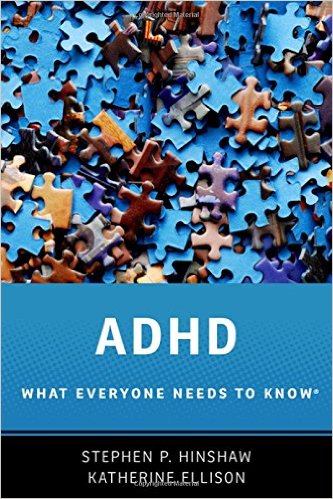Full disclosure: I received a free copy of this book in exchange for my honest review, but all opinions here are my own.
Part of me is always looking for the perfect ADHD book, even though I know it doesn’t exist. I need a whole shelf full of them to cover every angle.
ADHD: What Everyone Needs to Know may, however, be the perfect ADHD overview book. When the publisher contacted me about doing a review, the title made me skeptical. It’s a bold claim.
 However, once I started reading, I felt so fortunate to have found this book. It’s not all there is to know, but it is, as the title suggests, what everyone needs to know about ADHD. Not only that, it’s easy to read and weighs in at just under 200 pages.
However, once I started reading, I felt so fortunate to have found this book. It’s not all there is to know, but it is, as the title suggests, what everyone needs to know about ADHD. Not only that, it’s easy to read and weighs in at just under 200 pages.
The greatest value of ADHD: What Everyone Needs to Know isn’t even the ADHD crash course the authors so skillfully provide. The FAQ-style format will prepare readers with responses to others’ questions as well as their own. Remain open about your or your child’s ADHD for long enough and you’ll know exactly what I mean. With so much conflicting information and sensationalist reporting out there, a reasonable and comprehensive layman’s overview is long overdue.
I especially appreciated the nuanced perspective on recent surges in ADHD diagnoses among American children. The chapter exploring “who you are and where you live” leaves no room for black-and-white arguments. A close read reveals no single truth: yes, accountability laws that defund failing schools are correlated with increased ADHD diagnoses, not to mention increased use of stimulant medication. Yes, diagnosis rates dropped when the carrots of Race to the Top replaced the sticks of No Child Left Behind. However, that data is open to interpretation, and while overdiagnosis is certainly possible, it doesn’t delegitimize ADHD.
This balanced presentation of facts won’t validate any battle cries, but it may be our best bet for responding to those extreme viewpoints. Like most issues, ADHD — and our knowledge of it — contains many gray areas. I found it impossible to maintain a bias while reading this book. Hinshaw and Ellison offer their own interpretations, but they also explain why certain areas remain gray. For example, sometimes ethical issues prevent the controlled studies that would answer some of the toughest questions.
That said, I struggled with the authors’ treatment of ADHD in women and girls: specifically, the suggestion that boys with ADHD outnumber girls two or two-and-a-half to one, with the gender gap closing by adulthood. But perhaps this is informed by my own experience as a girl who struggled from a very young age, suffering in increasing silence as I reached middle and high school.
I’ve also read conflicting information on some forms of behavior therapy for children. Specifically, my personal experience and research discourages the use of external rewards and punishment, sticker charts, etc. (For an excellent, concise illustration of this point, check out Vicki Hoefle’s Duct Tape Parenting.)
The authors do acknowledge this problem, saying “the difficulty for children is to maintain their progress [outside] the tightly managed environment.” I myself excelled in the structured environments of grade school, college, and family. Shedding these supports in my 20s, I had no capacity to cope with my ADHD as it affected my adult life.
In this behavior therapy chapter, the authors’ well-rounded approach becomes confusing. While it begins by offering behavior therapy as a possible substitute for medication, it ends by saying most of us really need both. This latter point is weakened by ambiguous language earlier on.
Overall, ADHD: What Everyone Needs to Know is an essential read for any educated consumer seeking ADHD diagnosis and treatment. The book focuses more on childhood ADHD than adult ADHD, but there’s enough general information to give both groups an excellent foundation. If you’re struggling with questions about your or a loved one’s ADHD — including your response to others’ unsolicited questions and opinions — this book is for you.
Hey there! Are you enjoying The ADHD Homestead?
Here's the thing: I don't like ads. I don't want to sell your attention to an advertising service run by the world's biggest data mining company. I also value my integrity and my readers' trust above all, which means I accept very few sponsorships/partnerships.
So I'm asking for your support directly. For the cost of one cup of coffee, you can help keep this site unbiased and ad-free.
Below you will find two buttons. The first lets you join our crew of Patreon pals and pledge monthly support for my work. Patrons also have access to my Audioblogs podcast. The second takes you to a simple donation page to pledge one-time or recurring support for The ADHD Homestead, no frills, no strings. Do whichever feels best for you!

